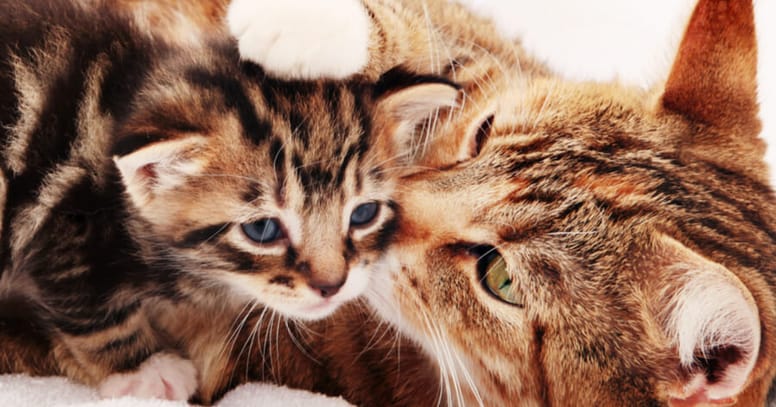Marie-Hélène Bonnet, cat behaviourist, explains the vicarious stage, a crucial period in which a kitten will observe and imitate the behaviour of the mother:
From their birth, a kitten’s training begins, but it real twist at around 1 month old when a kitten will start exploring his surroundings, accompanied by his mother, naturally.
What is vicariousness?
It is when the kitten starts imitating everything he sees: this is the start of the vicariousness phase. This phase will last until the psychosocial weaning, around 3 months, but will be more intense between 4 and 8/9 weeks.
The mother will make the most of the kittens’ state of mind and lead by example. Whatever she does, they will have to copy: grooming, eating, scratching the litter box, chasing a toy, etc.
Of course, vicariousness is not exclusive to cats, this behaviour can be observed among many mammals, including humans! What child has never copied their parents? But it’s cats that make the most of this opportunity to quickly teach their kittens.
Occasionally, a kitten will not complete her education (she may have been separated from her mother before 3 months, for example, or has never met a human and therefore not know how to approach them, etc.). She can not teach her little ones what she does not know! In a community, like in a breeder’s home, all the adult cats will take part in this phase, so as to teach the young kittens as much as possible. And there is little difference whether the adults are male or female. In fact, it seems that when it comes to teaching their babies, males are just as maternal as females.
The kittens tend to become more “resourceful” than their mother, or they may be less fearful, more sociable etc. This is why you must never isolate a litter when they begin exploring.

A method that has its flaws
It is also essential to provide the young kitten with many toys to make the mother’s acting more realistic. One toy will serve as prey, another as a fellow cat, and a third will be a predator ... They will quickly begin to understand the social relationships, which can then be applied to the kittens between them, and learnt through play.
Despite all this, this method has its flaws. Let’s take an example to illustrate this: A kitten bites his mother whilst playing, and hurts her. She will bite the kitten back, so he understands the pain it caused and that he should not bite (she will also most likely hit him on the nose). Another kitten who witnessed this scene, will begin to cry as soon as she is bitten by another, it is the characteristic of the phenomenon of vicariousness. This kitten will not know that her brother’s cry was caused by pain, all she will know is, when you are bitten, you should cry.

In this example, we see that learning by watching can distort the kitten’s interpretation of a situation. This is the main flaw of this method of education, but the mother remedies to it very quickly. It should also be noted that kittens tend to “act" but that phase will pass naturally and very quickly. Once the main information is assimilated, the theatrical side will disappear.
Once fully grown, we can observe the phenomenon of vicariousness in many ways: for example, in a community, a cat will copy the actions of a friend, that he never did before.
Equally, in certain cases it can happen that a cat behaves like the dog of the house (in particular we see cats giving their paw to be rewarded with a treat, just as the dog in the house does).
To conclude, this capacity, although reduced at the end of weaning, will enable the cat to adapt to his environment and life forever. Note, however, that a kitten separated from her mother before 14 weeks will have more trouble with this, and will need longer to adapt to change, which once again highlights the importance of psychosocial withdrawal!

